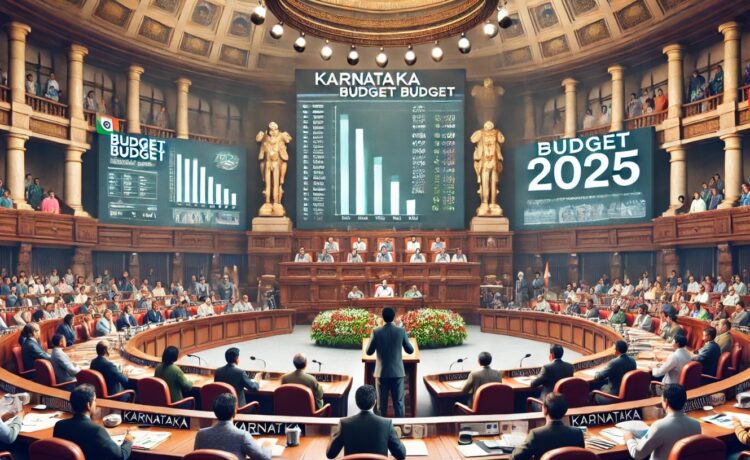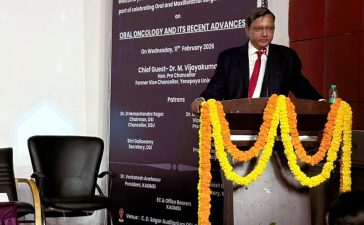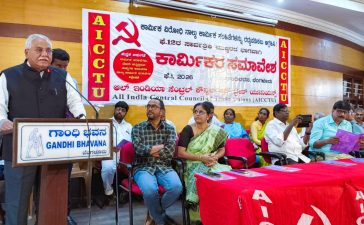Breaking Down Karnataka’s Budget: Who Pays, Who Benefits?
Baseless Criticism of Karnataka’s Budget
Following Chief Minister Siddaramaiah’s presentation of the Karnataka Budget, certain media houses launched an unwarranted attack, labeling it a “halal budget.” Such criticism reflects the intellectual bankruptcy of sections of the media, which have repeatedly failed to offer meaningful budget analyses. Instead of assessing fiscal policies with depth and understanding, these media outlets have focused on divisive rhetoric, degrading journalistic integrity in the process.
Karnataka’s television media has long struggled to provide well-researched, balanced evaluations of state budgets. Their discussions often serve as entertainment rather than informative debates. Their biggest achievement so far seems to be dividing society along religious lines while pushing misleading narratives rather than fostering constructive discourse.
The Reality of Muslim Representation in the Budget
Despite being the second-largest community in Karnataka after Dalits, Muslims have historically received minimal representation in budget allocations. This year, the budget has offered slightly more substantial provisions for the community compared to previous years, but even this moderate allocation has been met with hostility from opposition parties and biased media outlets.
The primary reason behind such opposition is a mix of ignorance and communal politics. Critics conveniently ignore the fact that government revenues are generated through taxation from all communities. If allocations to the Muslim community are to be questioned, then a logical counterpoint would be to examine their contribution to state revenues.
Muslims: A Major Contributor to Karnataka’s Economy
Estimates suggest that, collectively, the Muslim community is one of the largest contributors to Karnataka’s treasury. Ironically, even those now opposing budgetary allocations to Muslims are well aware of this fact. While ideal governance should transcend religion and caste when assessing economic contributions, those who oppose assistance on religious grounds must also be willing to acknowledge revenue inflows based on the same parameters.
If the government were to meticulously analyze community-wise revenue contributions, the numb
ers would reveal a stark reality. The present political, social, and economic framework already categorizes every aspect along religious and caste lines. In such a scenario, ignoring the economic contributions of different communities while opposing allocations selectively is a blatant double standard.
Economic Contributions of the Muslim Community
A rough estimate suggests that Muslims contribute significantly to state revenue, especially through taxation. The community has a dominant presence in various commercial sectors, making them one of the largest consumer bases in Karnataka. Businesspersons across the state recognize the economic weight of Muslim consumers.
Key sectors such as textiles, fishing, and small-scale industries are heavily influenced by Muslim entrepreneurs. Even in foreign exchange earnings, the Muslim community plays a major role. Though their presence in agriculture and IT sectors may be slightly lower, their overall economic input remains substantial.
Historical Disparities in Resource Allocation
Despite being significant contributors to the economy, the Muslim community has never received even 10% of what they contribute to the national or state treasury in the form of benefits or welfare schemes. Any basic understanding of economics makes this clear. While it is not necessary for every community to receive benefits exactly proportional to their contribution, it is entirely unjustified to claim that Muslims are receiving “too much” when, in reality, their share has been historically marginal.
Governments—both at the state and national levels—have always been the biggest beneficiaries of Muslim economic contributions. If data on tax revenue contributions were made public, those claiming that Muslims receive an unfair share of the budget would find their arguments utterly baseless.
A Call for Fair Budgeting
It is not too late for governments to introduce transparent revenue-expenditure calculations based on community contributions. If Karnataka’s budget were to allocate just 10% of the revenue generated by the Muslim community back to them, it would be at least ten times higher than current allocations. Such transparency would silence misleading media narratives that deliberately attempt to create resentment.
For decades, Muslims have endured underrepresentation in political spaces and minimal access to government benefits. This is largely due to deceptive portrayals by sections of the media that thrive on divisive storytelling. Their misleading narratives bear resemblance to the propaganda tactics used by Nazi Germany against minorities. This dangerous agenda has created a society steeped in communal bias and misinformation.
Final Thought: A Matter of Fairness and Integrity
In the end, fairness in budgeting should be about acknowledging contributions and ensuring equitable distribution of resources. Those who contribute significantly to the economy deserve due re
cognition and support. When a community that has consistently fueled Karnataka’s economic engine receiv
es even a fraction of its contributions in return, questioning such allocations reeks of prejudice.
It is time to challenge the media’s hypocritical narratives and demand accountability from those who
manipulate public perception. Budget allocations should be about economic justice, not religious favoritism. Those opposing the fair treatment of Muslim taxpayers should introspect on whether their stance is driven by facts or by a communal agenda that serves no one but political opportunists
By: Mushtaq Hennabail
Quotes:
- “Before questioning how much a community receives, shouldn’t we ask how much they contribute?”
- “A budget should be judged by its impact, not by communal rhetoric.”
- “The truth is simple: Karnataka’s Muslims contribute significantly to the state’s economy, yet their share of benefits remains minimal.”
- “Economic contribution should be a factor in policy discussions, not just political convenience.”
- “Taxation has no religion. Why should budget benefits be seen through a religious lens?”
Q&A:
Q: Why is there controversy over budget allocations to Muslims in Karnataka?
A: The opposition and some media groups claim that the budget unfairly favors Muslims. However, economic data suggests that Muslims contribute significantly to state revenue, yet receive proportionally less in government benefits.
Q: Does the budget allocation for Muslims come at the cost of other communities?
A: No. Budgets are structured to address various social and economic needs. The allocation is not about religious favoritism but about equitable resource distribution based on economic realities.
Q: Why are some calling it a “Halal Budget”?
A: The term “Halal Budget” is being used pejoratively by certain groups to communalize fiscal policy. However, Karnataka’s budget remains secular and data-driven.
![]()













Every weekend i used to pay a visit this web site,
for the reason that i want enjoyment, as this this website conations
truly pleasant funny information too.
my homepage; cewek telanjang